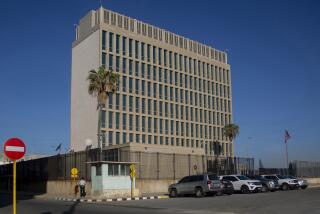Brain Damage Is Diagnosed in Gulf War Vets
- Share via
WASHINGTON — New research into Gulf War illness released Tuesday has found the first evidence of brain damage in ailing veterans, lending further support to suspicions that toxic chemicals are the cause of a mysterious affliction that has affected more than 30,000 former U.S. troops.
Magnetic scans found that veterans with the syndrome have markedly lower concentrations of a key chemical in the brain, according to researchers at the University of Texas Southwestern Medical Center in Dallas. The findings in the Pentagon-sponsored study suggest that dangerous compounds such as nerve gas or pesticides may have knocked key brain cells out of whack, they said.
If the study results are borne out by subsequent research and a cause of Gulf War illness is substantiated, affected veterans could be entitled to a higher level of treatment and benefits, government officials said.
Since the end of the 1991 war with Iraq, many U.S. troops have complained of a variety of chronic symptoms--including joint and muscle pain, fatigue, memory loss and nausea--that are collectively referred to as Gulf War illness. Although they remain controversial, explanations blaming wartime exposure to dangerous chemicals recently have found new support.
A Pentagon-sponsored study in October found reason to suspect that an experimental nerve gas antidote dispensed to troops during the conflict may be one cause of the ailment.
Dr. James Fleckenstein, a professor of radiology at UT-Southwestern, said his organization’s study indicates the vets’ complaints are not the products of battlefield stress, as a presidential advisory panel suggested two years ago.
“This validates that these are sick people, not people who are crazy, or depressed, or trying to get money,” Fleckenstein said.
But the findings were greeted cautiously by some outside analysts and officials at the Pentagon, which co-sponsored the new study with the Ross Perot Foundation.
The study examined veterans with magnetic resonance spectroscopy, which uses radio waves to measure body chemistry.
It found that 22 veterans with Gulf War illness symptoms had concentrations of a brain chemical called N-acetyl-aspertate that were 10% to 25% lower than those of a group of 18 healthy veterans. The study was blinded, meaning radiologists interpreting the results did not know which patients were complaining of symptoms and which were healthy.
The lower concentrations of the chemical NAA suggest a loss of neurons in the brain stem, which controls some body reflexes, and in the basal ganglia, which is the brain’s switching station for movement, memory and emotion, researchers said.
Even a 10% loss of NAA would be a “pretty severe hit” to brain function, Fleckenstein said.
UT-Southwestern researchers believe the ill veterans have a genetic vulnerability to some of the dangerous chemicals present in the Persian Gulf battle theater. These include the pesticide DEET, insect repellents, nerve gas and a nerve gas antidote called pyridostigmine bromide that was administered to thousands of U.S. troops.
Lt. Col. Dian Lawhon, a spokeswoman for the Pentagon’s Gulf War illness office, said defense officials have not seen the study results, which were released Tuesday in Chicago at a meeting of the Radiological Society of North America. She noted that the sample size was small and the study has yet to be replicated by other researchers.
Added another Pentagon spokesman, Adm. Craig Quigley: “There are many steps to go here.”
Dr. Arthur Caplan, a bioethicist with the University of Pennsylvania and a former member of a presidential advisory commission on the illness, said the finding of chemical changes in the brain is “good news” for veterans and will make it more likely that the government and the public will take their complaints seriously.
Still, he said he believes that loss of the brain chemical NAA would not necessarily help researchers track the cause of the ailment. He compared the findings to a discovery of ashes showing that a fire has inflicted damage but not signaling what set it off.
Matthew Puglisi, assistant director of the American Legion, the nation’s largest veterans group, said the results are “intriguing,” but also noted the limitations of such a small study.
The discovery of a cause for Gulf War illness could bring an increase in treatment and benefits available to its victims.
Under the law, Persian Gulf veterans who have unexplained ailments are presumed to be suffering from a service-related illness and are eligible for medical care. Yet, in many cases, their doctors may believe their symptoms are caused by other, less grave problems and treat them accordingly, Pentagon officials acknowledge. An official diagnosis of Gulf War illness could lead to more extensive treatment and a higher level of disability compensation, they said.
More to Read
Sign up for Essential California
The most important California stories and recommendations in your inbox every morning.
You may occasionally receive promotional content from the Los Angeles Times.












